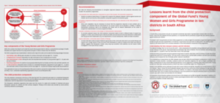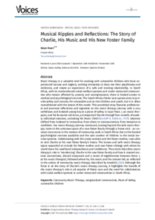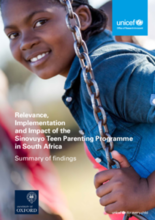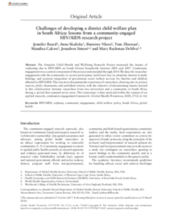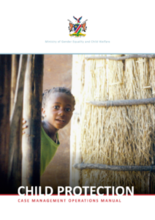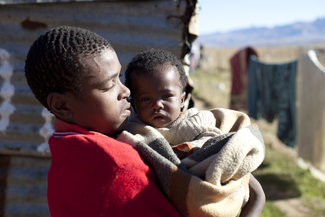

Displaying 21 - 30 of 131
This briefing paper reports on the lessons learnt from a process evaluation of the child protection component of the Global Fund’s Young Women and Girls (YWG) programme, a multi-pronged HIV prevention programme targeting young women and girls implemented in 10 districts in South Africa.
This qualitative study sought to explore the perspectives of a group of South African caregivers, all of whom were in receipt of a Child Support Grant (CSG), in relation to their own caregiving and family functioning.
This anecdotal story features professional and personal reflections and vignettes on the music therapy journey with a very withdrawn and isolated young boy at a place of safety in Cape Town, South Africa.
This article examines the findings of a mixed-method implementation-evaluation of a local non-governmental organization's Orphans and Vulnerable Children program.
This article describes and compares the Not in Employment, Education, or Training (NEET) and Education, Employment, and Training (EET) status of care leavers from Girls and Boys Town after 1 and 2 years and in relation to other outcomes.
This report summarizes research findings on the impact of the Sinovuyo Teen Parenting programme piloted in the Eastern Cape, South Africa, between November 2014 and September 2016.
In this qualitative study with four Child and Youth Care Centers in a town in the Eastern Cape, South Africa, focus groups were held with young people in care and their care workers to discuss preparation for leaving care and aftercare services and the evaluation of these by each group of participants.
This narrative documents the experience of researchers with the objective of documenting lessons learned in the Amajuba Child Health and Wellbeing Research Project, a collaboration between researchers from two universities and a community in South Africa which measured the impact of orphaning due to HIV/AIDS on South African households between 2004 and 2007.
The Amajuba Child Health and Wellbeing Research Project measured the impact of orphaning due to HIV/AIDS on South African households between 2004 and 2007. Community engagement was a central component of the project and extended through 2010. This article describes researcher engagement with the community to recruit participants, build local buy-in, stimulate interest in study findings, and promote integration of government social welfare services for families and children affected by HIV/AIDS.
This Manual includes background information, standard operating procedures with documentation tools and job aids on case management.

